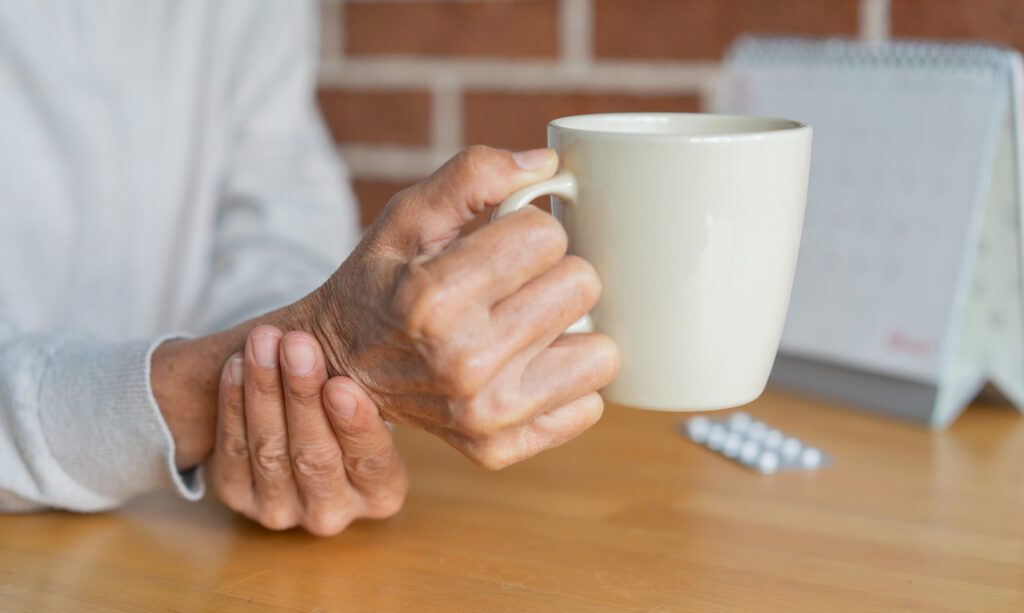Parkinson’s Disease: A Multi-System Condition That Needs a Root Cause-Based Approach
Parkinson’s Disease (PD) is the second most common neurodegenerative disorder globally, affecting over 10 million people worldwide (Parkinson’s Foundation, 2023). In India alone, prevalence estimates range from 70 to 328 per 100,000, with cases rising sharply in those aged 60 and above (Kumar et al., 2022).
Traditionally viewed as a dopamine-deficiency disorder, Parkinson’s results from the gradual degeneration of dopaminergic neurons in the substantia nigra pars compacta, causing a dopamine shortfall in the nigrostriatal pathway which is a critical circuit for movement control. This leads to hallmark motor symptoms like bradykinesia, rigidity, resting tremor, and postural instability, often accompanied by disabling non-motor symptoms including constipation, sleep disruption, depression, cognitive decline, and autonomic dysfunction.
Emerging scientific evidence redefines Parkinson’s as a multi-system, multi-etiological disease, extending far beyond dopamine loss. Key pathological contributors include:
-
Alpha-synuclein aggregation, beginning in the gut or olfactory bulb and spreading to the brain (Braak’s Hypothesis)
-
Mitochondrial dysfunction and oxidative stress, driving neuronal energy failure and apoptosis (Schapira et al., 2011)
-
Gut dysbiosis and intestinal permeability, which fuel systemic inflammation and often predate motor symptoms by a decade (Sampson et al., 2016; Bedarf et al., 2017)
-
Exposure to environmental neurotoxins like pesticides, heavy metals, molds, and solvents (Tanner et al., 2011; Goldman et al., 2012)
-
Impaired autophagy, leading to intracellular buildup of misfolded proteins such as alpha-synuclein (Menzies et al., 2017)
Limits of Conventional Treatment in Parkinson’s Disease
Standard dopaminergic medications like Levodopa-Carbidopa, dopamine agonists, and MAO-B inhibitors can help manage motor symptoms. However, they do not slow disease progression and may cause long-term side effects like dyskinesias and motor fluctuations (Olanow et al., 2004; Fox et al., 2018). Non-motor symptoms often remain under-treated, contributing significantly to disability.
Why an Integrative Root Cause Rehabilitation Approach Is Needed
Evidence now supports that integrative therapies targeting the root causes of Parkinson’s disease such as mitochondrial enhancement, gut-brain axis repair, neuroplasticity training, and toxin clearance can enhance outcomes, improve quality of life, and even slow the trajectory of disease progression (Titova & Chaudhuri, 2018; Mischley et al., 2017).
Our Team
- Rehabilitation Physicians
- Orthopedic Surgeon
- Regenerative Medicine Physicians
- Functional and Lifestyle Medicine Physicians
- Ayurveda Physician
- Naturopathy and Yoga Physicians
- Physiotherapists
- Occupational Therapists
- Aquatic Therapists
- Speech Therapists
- Tai Chi and Qi Gong Therapists
- Alexander and Feldenkrais Teachers
- Orthotist and Prosthetist
- Clinical Psychologists
- Nutritionists
- Health Coaches
- Sleep and Circadian Health Experts
- Nurses
- Patient Care Coordinators
- Other professionals, as required
At Recoup Health, we apply over 25 years of clinical experience to deliver a 4R Integrative Root Cause Rehabilitation Approach—a structured, evidence-informed model that supports recovery across multiple domains.
This 4R framework includes:
-
R1: Relief of Symptoms
-
R2: Root Cause Redressal
-
R3: Restoration
-
R4: Regeneration and Longevity
The Recoup 4R Protocol represents a clinically comprehensive and holistic model designed to enhance neuroprotection, functional independence, and long-term resilience in Parkinson’s disease.
Case History: 62-Year-Old Male with Mid-Stage Parkinson’s Disease
A 62-year-old retired professional presented to Recoup Health with a 4-year history of idiopathic Parkinson’s Disease. His primary symptoms included resting tremor in the right upper limb, bradykinesia, rigidity, postural instability, and freezing of gait. Non-motor symptoms included chronic constipation, disturbed REM sleep, fatigue, mild depressive features, and early cognitive decline. He had been on Levodopa-Carbidopa (600 mg/day) for two years and was experiencing motor fluctuations, wearing-off periods, and reduced responsiveness. His initial UPDRS (Unified Parkinson’s Disease Rating Scale) score was 42, and MoCA (Montreal Cognitive Assessment) score was 23. He was seeking a more holistic and long-term approach beyond medication.
We began with a comprehensive functional and neurological assessment, including gait analysis and detailed history of symptom progression and medication response. Advanced testing was done to evaluate gut health, toxin load, nutrient deficiencies, hormonal status, and mitochondrial function. Our multidisciplinary team comprising rehabilitation physicians, physiotherapists, functional medicine experts, clinical nutritionists, occupational therapists and psychologists collaborated to formulate a personalized, integrative care roadmap. Patient and his caregivers were actively involved from the start, with clear goal-setting, expectation alignment, and education on lifestyle strategies and disease mechanisms. This tailored plan was then executed using our 4R Integrative Root Cause Rehabilitation Protocol, ensuring every intervention addressed a specific clinical or physiological need.
R1: Relief of Symptoms
The acute phase of PD is marked by motor impairments (bradykinesia, tremor, rigidity, postural instability) and non-motor symptoms (depression, fatigue, sleep dysfunction, constipation, cognitive decline). This phase aims to achieve symptom relief, independence in activities of daily living (ADLs), and improved functional mobility. Suggested interventions in this phase include:
-
- Neuro-education: Education on PD progression, neuroplasticity, and patient empowerment through structured routines and self-care strategies.
- Pharmacotherapy: Conventional Anti-Parkinsonism Drugs like Levodopa + Carbidopa, Dopamine Agonists, MAO-B Inhibitors, COMT Inhibitors, Anticholinergics, Amantadine, Cholinesterase inhibitors, along with appropriate supplements.
- Physical Therapy: LSVT-BIG (Lee Silverman Voice Treatment) Protocol for motor activation, Proprioceptive training, and Frenkel Exercises for gait freezing, Balance retraining, fall prevention programs, postural control, and gait re-education. Stretching and mobility drills to reduce rigidity.
- Aquatic Therapy: Resistance-based movement training, postural control, and relaxation.
- Body Weight Supported Treadmill Training: For improving gait rhythm, step length, and endurance.
- Whole Body Vibration Therapy: For postural instability, muscle activation, and fall reduction.
- Hippotherapy (horse simulator): Trunk control and balance improvement.
- Tai Chi, Qi Gong, and Yoga: Improve proprioception, stability, mindfulness, and respiratory control.\
- Franklin Method: Neurocognitive imagery for correcting motor patterns and improving body awareness.
- Occupational Therapy (OT): ADL re-training, Fine motor control, adaptive tools training, Energy conservation, and home safety adaptations.
- Speech and Swallowing Therapy: LSVT-LOUD for hypophonia, Expiratory Muscle Strength Training (EMST), and dysphagia management
- Exergaming and Smart Devices: Smart Playball, VR tools for cognitive-motor integration (e.g., attention, visuospatial skills, hand-eye coordination).
- Sleep Optimization: Sleep coaching, supplementation, CBTi, circadian retraining.
- Colon Hydrotherapy: For bowel regulation and relief from constipation (common in PD).
- Anti-inflammatory Nutrition
- Psychological First Aid: CBT-based interventions, Pain Reprocessing Therapy, emotional regulation strategies, and caregiver psychoeducation.
R2: Root Cause Redressal
Focuses on investigating and addressing upstream biological, microbial, environmental, and metabolic contributors to the pathophysiology of Parkinson’s disease. Suggested interventions include:
- Comprehensive Functional Testing: Gut microbiome and intestinal permeability (zonulin, calprotectin), Heavy metals, pesticides, and mycotoxins, Nutrient panel (CoQ10, Vitamin D, B vitamins, magnesium, Omega-3), Mitochondrial function (organic acids, lactate/pyruvate ratio), Neurotransmitter and hormone profiling.
- Colon Hydrotherapy: Gut detoxification, rebalancing microbiota, and bowel clearance.
- Red Light Therapy (Far and Near Infrared): For mitochondrial activation, ATP production, and microglial modulation.
- Cold and Heat Exposure: Infrared sauna, cold showers, and contrast therapy to induce autophagy, improve detoxification, and stress resilience.
- Breathwork and Vagal Nerve Stimulation: HRV biofeedback, resonance breathing, and cold face immersion for parasympathetic activation.
- PEMF Helmet Therapy (Pulsed Electromagnetic Field Therapy): Non-invasive brain stimulation using low-frequency, low-intensity electromagnetic fields delivered through a helmet to target motor and prefrontal cortical areas.
- Exercise Therapy with HRV Biofeedback: Heart-rate regulated aerobic sessions with HRV optimization to reduce neuroinflammation.
- Anti-Inflammatory and Neuroprotective Nutrition:
- Mitochondrial Enhancement Therapy: IV Nutrition (CoQ10, NAD+, B vitamins, magnesium, ALA), Oral glutathione, acetyl-L-carnitine
- Mind-Body Therapies: EMDR for trauma processing, DBT and EFT for emotional regulation and nervous system resetting.
- Ayurveda Detoxification: Panchakarma therapies (basti, virechana) to remove toxins linked to neurodegeneration.
R3: Restoring Physiological Balances
This phase aims to restore balance across interconnected physiological systems by enhancing metabolic stability, improving neuromuscular coordination, and strengthening emotional resilience. Key interventions in this stage include:
- Advanced Neurorehabilitation: Coordination Dynamics Therapy (CDT), Virtual and Augmented Reality-based movement retraining, Functional Electrical Stimulation (FES) for tremor and rigidity, Neurofeedback for emotional and cognitive optimization, HRV-based breath retraining
- Alexander Technique and Feldenkrais Method: To re-educate movement patterns, enhance proprioception, and increase fluidity of movement.
- Continuous Glucose Monitoring (CGM): Detection and correction of dysglycemia, insulin resistance management.
- IV Micronutrient Therapy: Glutathione, Vitamin C, B-complex, taurine, magnesium, and amino acid blends
- Treatment of Chronic Infections and Toxins: If identified, use protocols including chelation, binders, and antimicrobials
- Occupational Therapy and Ergonomic Support/Home Modifications
- Hormone Profile Review and Replacement (if needed):
- Psychological Empowerment: Purpose therapy, values-based journaling, Group resilience workshops, and structured group therapies
- Speech and Language Therapy (Advanced): Cognitive-Communicative Training, Fluency and Prosody Retraining, Script Training and Conversational Coaching, Voice-Assisted Technology, Swallowing Rehabilitation.
- Mirror Therapy: Visual feedback using the unaffected limb to promote motor imagery and cortical reorganization.
R4: Regeneration and Longevity
Focuses on supporting long-term neuroprotection, cellular renewal, slowing progression, and building resilience. Suggested Interventions during this phase:
- Hyperbaric Oxygen Therapy (HBOT): Enhances neurogenesis, stem cell activation, and oxygen delivery to hypometabolic brain regions
- Ozone Therapy and Molecular Hydrogen: Used to modulate oxidative stress and immunoinflammatory status
- IV Nutrition for Regeneration: NAD+, Glutathione, and regenerative nutrient blends
- Peptide Therapies
- Autophagy Enhancement Protocols:Intermittent fasting (16:8 or 18:6), Polyphenol-rich botanicals: spermidine, quercetin, resveratrol
- Anti-Aging Interventions: Telomere-preserving nutrients
- Frailty Index Monitoring: VO2 max, HRV tracking, grip strength, gait speed, cognition tracking (MoCA)
- Relapse and Decline Prevention Planning: Personalized action plans for worsening episodes, Regular telehealth monitoring via Recoup EPHR, Crisis preparedness, Health coaching, and caregiver support
6-Month Outcome Summary of patient
At the end of six months on the Recoup 4R Integrative Root Cause Rehabilitation Program, the patient demonstrated marked clinical improvements across motor, cognitive, autonomic, and functional domains:
-
Unified Parkinson’s Disease Rating Scale (UPDRS) total score improved significantly, from 42 at baseline to 24, reflecting enhanced motor control, postural stability, and functional mobility.
-
Montreal Cognitive Assessment (MoCA) score increased from 23 to 27, indicating reversal of mild cognitive impairment, particularly in areas of attention, executive functioning, and memory.
-
The patient had zero falls over the past three months, compared to five falls in the preceding quarter, reflecting improved balance, gait initiation, and confidence in mobility.
-
Sleep quality normalized (7–8 hours/night, restful), and chronic constipation—an early non-motor symptom—was fully resolved through gut-focused therapy and lifestyle modifications.
-
Noticeable improvements were observed in voice projection, speech clarity, gait rhythm, facial expression, and upper limb dexterity—resulting from integrated physical therapy, LSVT-LOUD, neuromotor training, and mitochondrial support.
-
The patient regained the confidence to walk independently every morning, and reported the ability to engage in social and professional activities without fatigue.
-
Subjectively, he described a significant increase in daily energy, greater emotional regulation, and a “clearer mind,” suggesting restored autonomic balance, improved neuroinflammation status, and enhanced mitochondrial function.
Why Choose Recoup Health for Parkinson’s Disease?
Led by Dr. Deepak Sharan, a global expert with over 25 years of experience in neurodegeneration and root cause medicine, Recoup brings together a world-class team of specialists in Physical Medicine and Rehabilitation, Regenerative Medicine, Functional Medicine, Ayurveda, physiotherapy, speech therapy, and nutrition all working in synergy under one roof.
✅ Ready to Take Back Control from Parkinson’s?
If you or your loved one is living with Parkinson’s Disease and looking for a comprehensive, science-backed, and root cause-focused approach, the Recoup Integrative Root Cause Rehabilitation Program could be the turning point.
💬 Speak to our expert team and begin your personalized healing journey today.
📞 Call us at: +91-80-69274900
🌐 Visit us at: www.recoup.health
📄 Download our brochure: Recoup PD Program Brochure
✨ Discover how the 4R Protocol can help you move better, think clearer, and live fully—with renewed confidence and independence.




